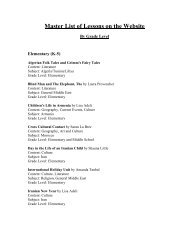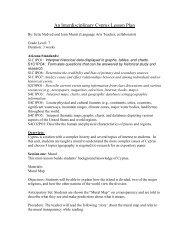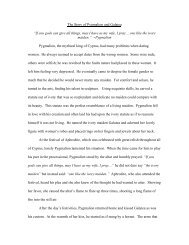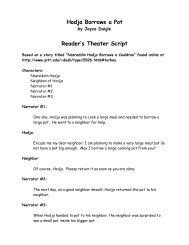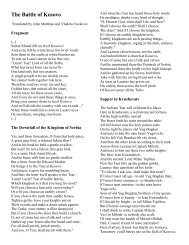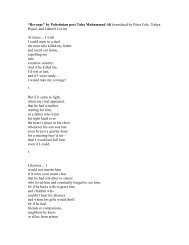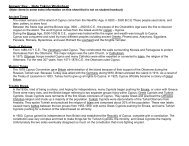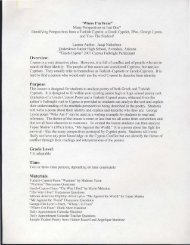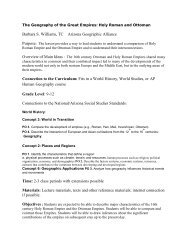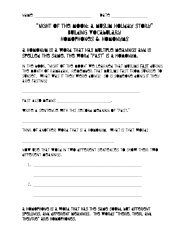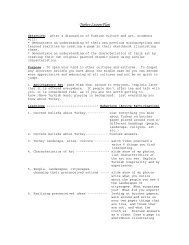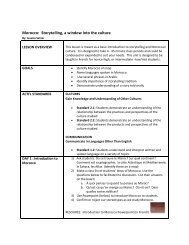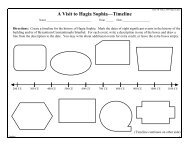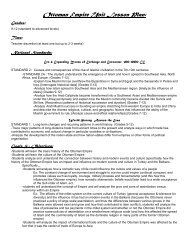Peace and Perspective Through Poetry - The Center for Middle ...
Peace and Perspective Through Poetry - The Center for Middle ...
Peace and Perspective Through Poetry - The Center for Middle ...
You also want an ePaper? Increase the reach of your titles
YUMPU automatically turns print PDFs into web optimized ePapers that Google loves.
<strong>Peace</strong> <strong>and</strong> <strong>Perspective</strong> <strong>Through</strong> <strong>Poetry</strong><br />
<strong>The</strong> Dream of <strong>Peace</strong> in the <strong>Middle</strong> East<br />
(Grades 6-8)<br />
By Tina Anima<br />
Teacher, 6 th Grade<br />
Social Studies/Language Arts<br />
McClure <strong>Middle</strong> School<br />
tmanima@seattleschools.org<br />
206.252.1851<br />
This lesson is adapted from a project from Spring 2008, when I teamed up with a Seattle<br />
poet to teach my 6 th graders about the Israeli-Palestinian conflict. With the poet’s<br />
guidance, an inspiring variety of poems from Arab <strong>and</strong> Jewish writers, <strong>and</strong> my own<br />
experiences from a 2007 fellowship to Jordan, my students learned about an area of the<br />
world they knew little to nothing about.<br />
My students read Habibi, Naomi Shihab Nye’s novel about a Palestinian-American girl<br />
who reconnects with her Arab heritage while also falling in love with a Jewish boy.<br />
Students can complete the following lesson without having read the book, but their<br />
experience <strong>and</strong> their work will be much richer if they have a chance to read the novel.<br />
<strong>Through</strong> this lesson, students will learn to use their pens <strong>and</strong> their minds to wage peace.<br />
<strong>The</strong>y will take on the personas of Palestinians <strong>and</strong> Israelis, <strong>and</strong> let their poems walk them<br />
through the streets of Jerusalem. <strong>The</strong>y will create poetry that will let readers taste the<br />
flavors of the <strong>Middle</strong> East, feel the raw emotion <strong>and</strong> pulse of an ancient people, <strong>and</strong><br />
discover their unflinching wisdom about war, peace, <strong>and</strong> hope.<br />
Resources used:<br />
<strong>Center</strong> <strong>for</strong> <strong>Middle</strong> Eastern Studies, University of Arizona<br />
www.cmes.arizona.edu/outreach/k12.php (“Background to the Palestinian-Israeli<br />
Conflict,” “Conflict <strong>and</strong> Compromise Since 1948”)<br />
Nye, Naomi Shihab, (1997). Habibi. New York: Simon Pulse Press / Simon & Schuster<br />
Children’s Publishing Division.<br />
Nye, Naomi Shihab, (2002). 19 Varieties of Gazelle: Poems of the <strong>Middle</strong><br />
East. NY: Greenwillow.<br />
“Biography of An Armenian Schoolgirl,” p.11<br />
Rubin, Robert Alden, editor. (1993). <strong>Poetry</strong> Out Loud. Chapel Hill, NC:<br />
Algonquin Books of Chapel Hill.<br />
from the section titled “Poems of Alienation,”<br />
“Israel,” by Karl Shapiro (p. 160) <strong>and</strong> “<strong>The</strong> Last Knocks,” by Palestinian poet<br />
Fadwa Tuqan, (translated by Issa J. Boullata), p.162
Students will:<br />
• Increase their appreciation <strong>and</strong> underst<strong>and</strong>ing of the power of language to<br />
express awareness <strong>and</strong> concern related to struggles <strong>and</strong> conflicts from their<br />
own <strong>and</strong> other points of view;<br />
• Experiment with creating persona pieces while learning to focus on<br />
developing an authentic voice <strong>and</strong> choosing strong, compelling words;<br />
• Learn how art <strong>and</strong> poetry celebrate cultural <strong>and</strong> personal stories/histories;<br />
• Learn how diverse, globally based literature <strong>and</strong> poetry can help dispel<br />
biases <strong>and</strong> build bridges of underst<strong>and</strong>ing across borders <strong>and</strong> conflicts;<br />
<strong>The</strong> Lesson:<br />
Use Naomi Shihab Nye’s young adult novel, Habibi, as a mentor text. Use the<br />
University of Arizona’s <strong>Center</strong> <strong>for</strong> <strong>Middle</strong> Eastern Studies essays, “Background to the<br />
Palestinian-Israeli Conflict” <strong>and</strong> “Conflict <strong>and</strong> Compromise Since 1948” to give students<br />
background in<strong>for</strong>mation to underst<strong>and</strong> the novel.<br />
Once students have read the novel, pull one of the quotes that Naomi Shihab Nye<br />
places in the inset pages be<strong>for</strong>e Habibi begins. <strong>The</strong> quote is by Anndee Hochman:<br />
“Is a Jew a Palestinian? Is a Palestinian a Jew? Where does one begin to answer<br />
such a question? I will say this: we are cut from the same rock, breathe the scent<br />
of the same lemons <strong>and</strong> olives, anchor our troubles with the same stones,<br />
carefully placed. We are challah & hummus, eaten together to make a meal.”<br />
Read aloud two poems that present differing points of view, Karl Shapiro’s<br />
“Israel” <strong>and</strong> Fadwa Tuqan’s “<strong>The</strong> Last Knocks.”<br />
Students should discuss the poems in small groups, noting how each poet presents<br />
his views on the conflict. Lead a large class discussion on the language used <strong>and</strong> points of<br />
view expressed.<br />
Next, read two examples of persona poems. <strong>The</strong> first is Naomi Shihab Nye’s<br />
“Autobiography of an Armenian Schoolgirl,” <strong>and</strong> the second is Kim Staf<strong>for</strong>d’s “19<br />
March 2003,” from the perspective of an Iraqi child.<br />
For the rest of the session, students are to take on the persona of someone in the<br />
<strong>Middle</strong> East. A variety of characters <strong>and</strong> viewpoints are presented in Shihab Nye’s<br />
Habibi. Encourage students to use the novel to spark ideas. <strong>The</strong>y may write from the<br />
perspective of a young child, <strong>and</strong> elderly person, a street vendor, a soldier, a mother, a<br />
brother, a professor, a student.<br />
Using the poems below as mentor texts, students are to craft their own drafts of a<br />
poem addressing the conflict in the <strong>Middle</strong> East. As students write, play a slideshow of<br />
images from the <strong>Middle</strong> East to help them include realistic details in their work.<br />
19 March 2003<br />
Let me be light from the morning star,<br />
the glimmer between worlds.<br />
I am what you cannot see—at midnight<br />
or noon. I am the child in war<br />
putting my c<strong>and</strong>le in a paper boat
at the call to prayer. My mother says<br />
when I die I will be a secret.<br />
Little boat, you are my sister<br />
I put light in. Go find me<br />
a place to be. Allah is great,<br />
you are small. Go tell them<br />
your brother is here. My mother,<br />
my father, we—we are a secret,<br />
we are a boat, we are a light.<br />
We are the star that sees you.<br />
What we lost will be you,<br />
my mother says.<br />
-Kim Staf<strong>for</strong>d<br />
Biography of an Armenian Schoolgirl<br />
I have lived in the room of stone<br />
where voices become bones<br />
buried under us long ago.<br />
You could dig <strong>for</strong> years<br />
uncovering the same sweet dust.<br />
My h<strong>and</strong>s dream crescent-shaped cakes,<br />
trapped moons on a narrow veined earth.<br />
All day I am studying my h<strong>and</strong>s—giving them<br />
new things to hold.<br />
Travel, I say. <strong>The</strong>y become boats.<br />
Go—the bird squirms to detach from the arm.<br />
Across the courtyards, a radio rises up <strong>and</strong> explodes.<br />
What is the history of Europe to us if we cannot<br />
choose our own husb<strong>and</strong>s?<br />
Yesterday my father met with the widower,<br />
the man with no hair.<br />
How will I sleep with him, I who have never slept<br />
away from my mother?<br />
Once I bought bread from the vendor with the<br />
humped back .<br />
I carried it home singing,<br />
the days had doors in them<br />
that would swing open in front of me.<br />
Now I copy the alphabets of three languages,<br />
imagining the loops in my Arabic letters are eyes.<br />
What you do when you are tired of what you see,<br />
what happens to the gray body<br />
when it is laid in the earth,<br />
these are the subjects which concern me.<br />
But they teach algebra.<br />
<strong>The</strong>y pull our hair back <strong>and</strong> examine our nails.
Every afternoon predictable passage of sun<br />
across a wall.<br />
I would fly out of here. Travel I say.<br />
I would go so far away my life would be<br />
a small thing behind me.<br />
<strong>The</strong>y teach physics, chemistry.<br />
I throw my book out the window,<br />
watch the pages scatter like wings.<br />
I stitch the professor’s jacket<br />
to the back of his chair.<br />
<strong>The</strong>re is something else we were born <strong>for</strong>.<br />
I almost remember it. While I write,<br />
a ghost writes on the same tablet,<br />
achieves a different sum.<br />
Naomi Shihab Nye



